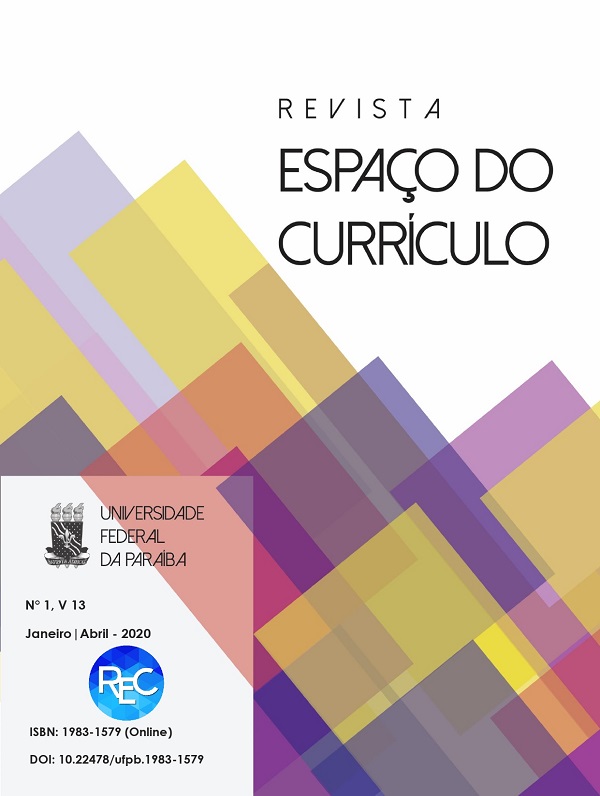PERSPECTIVES OF EMANCIPATION IN PEDAGOGICAL AND CURRICULAR PRACTICE
between theories and discourses
DOI:
https://doi.org/10.22478/ufpb.1983-1579.2020v13n1.41990Keywords:
Curriculum, Emancipation, Pedagogical PracticeAbstract
The article presents the results of an investigation on the perspectives of emancipation present in the discourses of professors of the Universities of Minho and Porto, in Portugal. The objective was to know how teachers work the concept of emancipation and how they do it, in order to identify which perspectives they adopt in their theoretical productions and how they configure them in their pedagogical and curricular practices. This research has a qualitative approach, which initially entailed the bibliographical study on the concept of emancipation and, later, semi-structured interviews as data collection instruments. For the analysis and discussion, there were the theoretical contributions of the fields of philosophy and curriculum, with this philosophical basis the theoretical framework was constituted. For the interviews, six teachers were selected, according to the following criteria: acting in courses of Education and Technology of Curriculum Development and consolidate emancipation as a guiding element of their pedagogical practice and their theoretical productions. The results showed that, in the interviewees discourse, emancipation is put in perspective as a synonym of critical, reflective and transformative education. It is conceived as a possibility for the critical thinking development and for making changes in individuals – in the sense of Kantian Enlightenment - and therefore as the purpose of education. Analyzed from the theoretical foundation, this emancipation perspective gets close to the approaches of the Frankfurt School Critical Theory, which is also present in the Critical Curricular Theory.
Downloads
Metrics
References
ADORNO, Theodor Ludwig Wiesengrund. Educação e Emancipação. 5. ed. Rio de Janeiro: Paz e Terra 2010.
ADORNO, Theodor Ludwig Wiesengrund; HORKHEIMER, Max. Dialética do Esclarecimento. Rio de Janeiro: Zahar, 1985.
APPLE, Michael W. Educação e Poder. Porto Alegre: Artes Médicas, 1989.
______. Trabalho Docente e Textos: economia política das relações de classe e de gênero em Educação. Porto Alegre: Artes Médicas, 1995.
______. Conhecimento oficial: a educação democrática numa era conservadora. Petrópolis, RJ: Vozes, 1997.
______. Política cultural e educação. São Paulo: Cortez, 2000.
______. Educação e Poder. Porto, PT: Porto, 2001.
______. Ideologia e Currículo. 3. ed. Porto Alegre: Artmed, 2006.
FREIRE, Paulo. Pedagogia do Oprimido. 11. ed. Rio de Janeiro: Paz e Terra, 1987.
GIROUX, Henry Giroux. Pedagogia Radical: subsídios. São Paulo: Cortez, 1983.
______. Teoria Crítica e Resistência em Educação: para além das teorias de reprodução. Rio de Janeiro: Vozes, 1986.
______. A Escola Crítica e a Política Cultural. 3.ed. São Paulo: Cortez, 1992.
______. Os Professores como Intelectuais: rumo a uma pedagogia crítica da aprendizagem. Porto Alegre: Artmed, 1997.
______. Cruzando as fronteiras do discurso educacional: novas políticas em educação. Porto Alegre: Artes Médicas Sul, 1999.
HABERMAS, Jürgen. Teoría de la Acción Comunicativa: complementos y estudios previos. 2. ed. Madri, ES: Ediciones Cátedra, 1994.
______.Teoría de la Acción Comunicativa: racionalidad de lá acción y racionalización social. Madri, ES: Taurus, 1999a.
______.Teoría de la Acción Comunicativa: crítica de la razón funcionalista. Madri, ES: Taurus, 1999b.
______. Consciência Moral e Agir Comunicativo. Rio de Janeiro: Tempo Brasileiro, 2003.
JACKSON, Phillip W. La vida en las aulas. 7. ed. Madrid, ES: Ediciones Morata, 2010.
KANT, Immanuel. Resposta à pergunta: O que é o esclarecimento? Tradução: Luiz Paulo Rouanet. [S.l: s.n], 1784. (mimeo).
MAAR, Wolfgang Leo. À guisa de introdução: Adorno e a experiência formativa. In: ADORNO, Theodor Ludwig Wiesengrund (Org.). Educação e Emancipação. 5. ed. São Paulo: Paz e Terra, 2010. p. 11-28.
MARX, Karl. O capital: crítica da economia política. Rio de Janeiro: Civilização Brasileira, 1974.
PERES, Elisandra de Souza. Currículo e Emancipação: uma articulação possível?Tese(Doutorado em Educação) -Universidade Federal de Santa Catarina, Centro de Ciências da Educação, Programa de Pós-Graduação em Educação (PPGE), Florianópolis, Santa Catarina, 2015.
SILVA, Tomaz Tadeu da. Documentos de identidade, uma introdução às teorias do currículo. 3. ed. Belo Horizonte: Autêntica, 2011.
SPENCER, Herbert. Educação Intelectual, Moral e Physica. Porto, PT: Chardon, de Lello & Irmão, 1927.
WILLIS, Paul. Aprendendo a ser trabalhador: escola, resistência e reprodução social. Porto Alegre: Artes Médicas, 1991.
Downloads
Published
How to Cite
Issue
Section
License
By submitting an article to Curriculum Space Journal (CSJ) and having it approved, the authors agree to assign, without remuneration, the following rights to Curriculum Space Journal: first publication rights and permission for CSJ to redistribute this article. article and its metadata to the indexing and reference services that its editors deem appropriate.
















